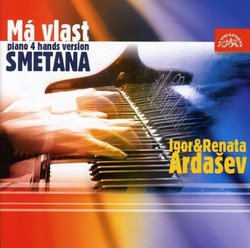| All Artists: Bedrich Smetana, Igor Ardasev, Renata Ardasevova Title: Smetana: Má vlast (Piano 4 Hands Version) Members Wishing: 1 Total Copies: 0 Label: Supraphon Release Date: 5/27/2003 Album Type: Import Genre: Classical Styles: Chamber Music, Forms & Genres, Theatrical, Incidental & Program Music, Historical Periods, Classical (c.1770-1830) Number of Discs: 1 SwapaCD Credits: 1 UPCs: 675754609825, 099925371227 |
Search - Bedrich Smetana, Igor Ardasev, Renata Ardasevova :: Smetana: Má vlast (Piano 4 Hands Version)
 | Bedrich Smetana, Igor Ardasev, Renata Ardasevova Smetana: Má vlast (Piano 4 Hands Version) Genre: Classical
|
Larger Image |
CD Details |
CD ReviewsAnd now, something a little different Jill Malter | jillmalter@aol.com | 11/11/2005 (5 out of 5 stars) "For those of us who are used to hearing Ma Vlast performed by a large orchestra, this version will be a bit of a surprise. The Ardasevs (Igor and Renata) are fine solo performers on the piano. Now, this husband-and-wife team get to show what they can do with Smetana's 4-hand version of his nationalistic cycle of symphonic poems. And they do a superb job, with the result being an unusually powerful overall performance. I highly recommend this CD. But I admit that I won't forget about the orchestral version." Piano Reduction be Damned - This is a Tour-de-Force Hexameron | 04/25/2007 (5 out of 5 stars) "Like Dukas's "Sorcerer's Apprentice," Dvorak's "New World Symphony" and Ravel's "Bolero," it's hard for a classical music fan to avoid hearing Smetana's "The Moldau" symphonic poem on the radio. Moreover, Smetana is really only known today because of Ma vlast and his "The Bartered Bride" opera. Some of us may venture into his String Quartet or some obscure piano pieces, but Smetana has single-handedly established a foothold in the concert repertoire with this stupendous and endearing cycle of symphonic poems. But as one of those classical listeners who has heard so many orchestral versions of these tone poems, let me impart a passionate declaration: Smetana's own four-hand piano arrangement as performed by Igor and Renata Ardasev triumphs over the orchestral version.
In fact, this performance lends weight to a famous Liszt anecdote I've always remembered with fondness: after Berlioz conducted the "March to the scaffold" from his Symphonie Fantastique, Liszt sat down at a keyboard and played his own arrangement. According to numerous accounts in the audience, the effect and passion of Liszt's playing surpassed all of the faculties of the orchestra and garnered a more enthusiastic applause from the spectators. Although I wasn't there, after experiencing the furore of music on this recording, I can understand how an extremely intimate, passionate, and powerful piano performance of an orchestral work can resonate to a higher degree. This piano duo plays each of Smetana's tone poems with an unlimited pool of virtues. Their animated vigor, wild abandon and unbridled force in the virtuosic passages is unparalleled by the orchestra, which by comparison seems tame under any conductor I've heard. After glancing at the picture of this couple, Igor and Renata Ardasev, on the CD pamphlet, one might assume a weak performance from this effeminate and frail-looking pair. But what a betraying image: the ferocity and stamina of their execution is super-human. In the robust "Vysehrad" and "Tabor," for instance, they reach glorious heights of sonority in all of the exultant crescendi of chords. Their prowess in balancing the dynamics of the lower bass with the higher registers is to be commended. While never banging, they press mercilessly into those bass chords; one imagines the piano roaring at times. "Tabor," especially, conveys the struggles of the Hussites and the gloomy atmosphere of a medieval battle. Under the piano, this piece exhibits all the satisfying grandeur of Liszt's best while still communicating Smetana's suggestive themes. "Blanik" is another successful Smetana arrangement, generating more intensity and clarity of melodic lines than the orchestral version tends to belie. I feel it's also important to mention how tremendous "Vtlava" sounds when played by two virtuosic pianists. The busy accompaniment of the main river theme is wonderfully evocative of the rushing water. But towards the end, I found myself completely enthralled by the onslaught of violent pianism. To say this piano duo was demonically possessed during that performance would be an understatement. What's miraculous is that their vicious attacks were so gracefully employed that their aim becomes clear: they contribute to creating the pictorial effect of the rapid stream of water gushing forth uncontrollably. I've spoken much of this piano duo's menacing strength and virtuosity, but I should also remark on their intimately sensual and crisp articulation. The flawless recording sound certainly helps, but this piano duo exemplifies a fine balance between acute sensitivity, interpretative wisdom, and tempestuous passion. Their efforts with "Sarka" for example demonstrates their congenial taste and dynamic control. "From Bohemian Fields and Groves" is also beautifully projected with plenty of emphasis on the meditative themes and the majestic swells that capitalize on Smetana's ideas. Overall, every single symphonic poem becomes a pianistic monument through the Ardasevs' fingers that I swear I prefer their spirited delivery over any orchestral version. Bottom line: With all the fine orchestral recordings of this famous work, some might find this CD unappealing. But I cannot emphasize enough how magnificent and rewarding these performances are. Whether it's the harmonic clarity of the rich textures or the wild fury of certain dramatic moments, I find this recording more memorable than any other Ma vlast performances I've heard. See for yourself how the piano does not bow to the orchestra - Highly recommended." |

 Track Listings (6) - Disc #1
Track Listings (6) - Disc #1